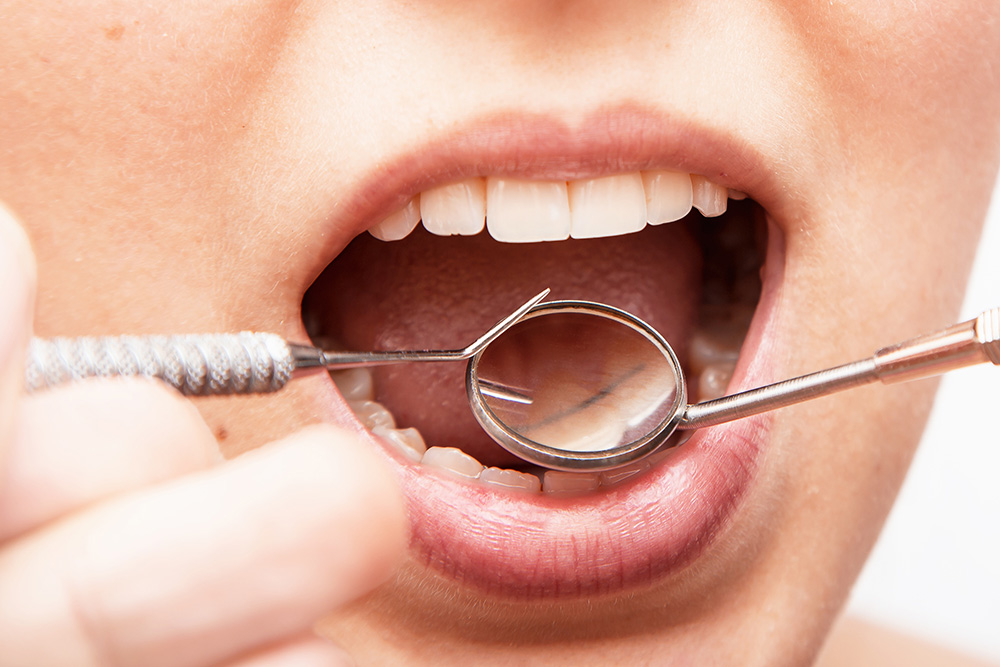Periodontal Disease Treatment

Tooth decay and cavities are not the only reasons preventive dentistry and good oral hygiene habits are important; good oral care can also help prevent periodontal disease development.
What Is Periodontal Disease
Periodontal disease, also called gum disease, is a bacterial infection of the gums.
What Causes Periodontal Disease?
Periodontal disease can develop when plaque and tartar accumulate on the surface of the teeth and push the gums away. Normal, healthy gums should hug the surface of the teeth, but when they become separate, pockets of space develop between the gums and the teeth, and harmful bacteria thrive in these spaces.
Plaque and tartar can accumulate, leading to the development of periodontal disease, as a result of poor oral hygiene habits or failing to visit the dentist often enough for professional teeth cleanings.
Periodontal Disease Signs and Symptoms
The signs and symptoms of periodontal disease include:
- Visible plaque and tartar buildup on the surface of the teeth
- Tender gums
- Red gums
- Swollen gums
- Receding gums
- Gums that bleed easily
- Persistently bad breath
- Tooth sensitivity
- Pus between the teeth
In more severe cases of periodontal disease in which bacteria have reached the periodontal ligaments, individuals with periodontal disease might also experience the following symptoms:
- Loose teeth and tooth loss
- A change in occlusion (the way the teeth bite together)
- Jawbone degeneration
The Importance of Treating Periodontal Disease
In addition to the local effects, periodontal disease can also have a negative impact on the general health of an individual. The bacteria from periodontal disease can enter a person’s bloodstream and travel throughout the body, leading to generalized inflammation and a whole host of systemic issues. Periodontal disease has been associated with health problems such as cardiovascular disease, diabetes, dementia, rheumatoid arthritis, reproductive challenges, and more.
Additionally, periodontal disease puts individuals at an increased risk of suffering from respiratory infections like pneumonia because the elevated levels of bacteria in the mouth can be breathed in more easily.
How To Treat Periodontal Disease
There are several treatments for periodontal disease, and the approach that works best for you depends on how advanced your case of periodontal disease is, in addition to your medical history and individual dental care needs.
More Frequent Professional Teeth Cleanings
We typically recommend more frequent dental exams and cleanings for all patients diagnosed with periodontal disease.
For patients with milder cases, more frequent cleanings are often all that is needed to arrest the progression of the infection and get the bacterial growth inside their mouths under control. In more advanced cases, additional treatments might be recommended, as well.
Prescription Medications and At-Home Care
Prescription antibiotics, antibiotic mouth rinses, and antibiotic gels and trays might be recommended and/or prescribed to help combat the bacteria responsible for periodontal disease.
Scaling and Root Planing
Scaling and root planing are two of the most common approaches to addressing periodontal disease. They involve scaling (scraping) the teeth to remove plaque and tartar buildup from the surface of the teeth above and below the gum line and planing the roots to smooth out their surfaces, discouraging bacterial growth.
Oral Surgery
In the most extreme cases of periodontal disease, gum surgery might be needed to remove dead and diseased tissues from the gums while sterilizing the bacteria that are present.
Periodontal Disease Treatment in Bucyrus
If you have been diagnosed with any form of gingivitis or periodontal disease, it’s important that you begin to address the problem right away. We welcome you to contact Oakwood Dental to learn more about periodontal disease and its treatment or to schedule a consultation.

 Meet Dr. Michelle Nagy
Meet Dr. Michelle Nagy Meet Dr. Attila Nagy
Meet Dr. Attila Nagy